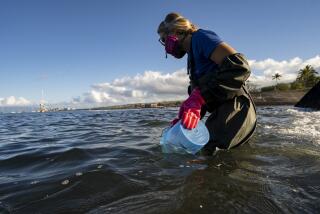Rise in ocean acidity makes fish anxious, study finds
Ocean acidification could alter the behavior of fish and make them more anxious, a new study says.
The finding came in an experiment by researchers interested in the neurological effects of the shift in the chemistry of seawater that is happening as the ocean takes up carbon dioxide that has built up in the Earth’s atmosphere from human activity.
In a laboratory, scientists put one group of young rockfish, a common species along the California coast, in normal seawater and put another group of the fish in water with the lower pH the ocean is predicted to reach in about 100 years.
After a week researchers transferred the fish in a specially designed tank to test for anxiety, with one side lined with white panels and the other with black panels. They recorded video of the fish and used computer software to track their movements.
While the fish in normal seawater explored both the dark and light sides of the tank, the rockfish that had been living in more acidic water acted as if they had been dosed with anxiety-inducing drugs, seldom swimming into the light.
“They would go to the dark part of the tank and they wouldn’t move. They just stayed there,” said Martín Tresguerres, a marine biologist at the Scripps Institution of Oceanography who co-authored the study.
The anxious behavior continued even after a week of rehabilitation in regular seawater. Only after 12 days did the fish return to normal.
Rockfish accommodate more acidic water by adjusting their blood, Tresguerres explained, but those changes alter important sensory receptors that control behavior like anxiety. That neurological process was first discovered by other researchers who found that rising levels of carbon dioxide in seawater interfered with smell and movement in tropical clownfish.
The latest experiment suggests rising ocean acidity could spell trouble for rockfish, a species that is popular with commercial and sport fishermen and lives in giant kelp forests, where the ability to move among the light and shadows is crucial to their survival.
“It could mean these fish will move less and be hidden more in the kelp blades,” Tresguerres said, “Or they could change their feeding and dispersal behavior.”
In the wild, Tresguerres noted, seawater is changing gradually over generations, so it’s possible rockfish will adapt in a way a short-term lab experiments cannot measure.
Twitter: @tonybarboza







